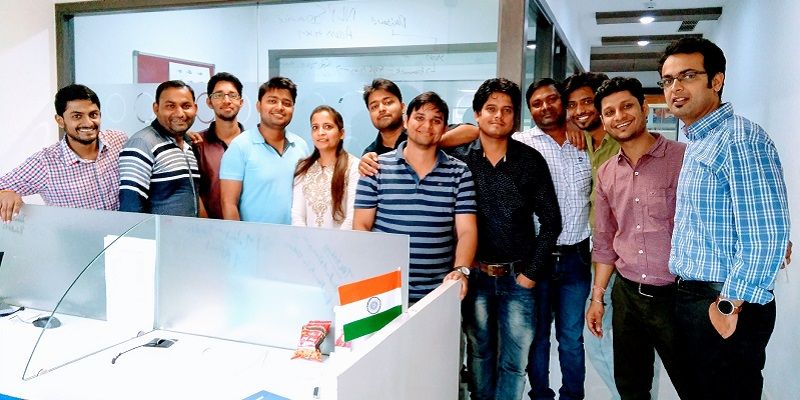This startup answers the eternal question: Where can I find the perfect white shirt?
Talespin is an AI plug-and-play platform that helps brands convert customers from different mediums.
Tanay Dixit is a hardcore product guy; at the age of 20, he co-founded Senfinance, and later, he went on to found Wemo, a digital marketing company. He got the idea for his third venture, Talespin, when he went to a store to buy a grey t-shirt in February last year.
After spending 20 minutes with the sales assistant, he finally managed to find what he wanted, only to discover–to his great annoyance–that it wasn't available in his size. The outcome: the salesperson felt ineffective at his job, the brand lost out on a sale, and the customer, Tanay, was left disappointed.
Thinking that there was need to improve the in-store customer shopping experience, Tanay approached his brother, 32-year-old Tapan Dixit, who had worked with companies like with Godrej Consumer Products, PepsiCo, and Idea Cellular in sales and marketing roles, to co-found Talespin in Delhi.

The building blocks
Over the next few months, the brother duo spoke to multiple people and also did a beta run with a brand to understand the problem in detail. They found that while most brands spend millions getting customers to stores, there is no proper hand-holding process at the store itself, resulting in an inconsistent customer experience, and thus lower customer conversion. This is how Talespin was born–with the intent to change customers’ shopping experiences. Says Tapan,
“Finally, I took the decision to quit my cushy corporate job and joined Talespin full-time–it was around this time that I had just been blessed with a baby girl. It was not an easy decision to make, but I had always wanted to do something of my own, and once the conviction was in place, I decided to take the plunge.”
Working as a customer-centric, assisted selling product, Talespin, simply put, aids brands in customer conversions. Tapan adds that no matter where the customer is–online, on social media, or at the physical outlet–Talespin helps in conversions.
Workings of the platform
Talespin helps customers find what they need–both online and in-store. Every item in the brand’s inventory is automatically categorised based on attributes like size, colour, sleeve and length, as well as style–what kind of occasion it is for or which seasonal trend it follows.
“Our technology stack uses deep learning to classify and tag product images and helps answer three core questions for customers–“What should I buy?”, “Is this available in my size?” and “Is there anything similar to this?”
For brands, Talespin offers cataloguing–which, in turn, answers the ‘what to buy?' question–image classification and similarity, and inventory management, and also provides a mechanism to collect consumer metrics at the store level.
To gauge the current preparedness of brands in terms of responsiveness to customer queries on social media, Talespin reached out to 60 brands in India–operating across apparels, footwear, kids clothing, jewellery, and cosmetics–through Facebook Messenger.
What the duo discovered surprised them. Tapan says that seven of the 60 brands had disabled the messaging options, and of the remaining, 40 percent didn’t reply even after a week, while another 26 percent took more than a day to reply.
“In this ‘I want it now’ culture, customers don’t have the patience to wait for a day,” points out Tapan.
Of the brands 34 percent of brands who responded within a day, 28 percent responded using template replies instead of personalised messages. Personalisation is an important aspect of customer acquisition and business growth, and is a must when responding to customers.
Team and working with brands
“We are currently a 10-member-strong team across Delhi NCR and Ahmedabad. Our team comprises of engineers, business developers, a financier, and sales and marketing folk,” says Tapan.
Talespin also has a bot for their clients that help brands respond to customers instantaneously. It answers customer queries and helps make a sale. It can also function as an in-store shopping assistant, helping customers with product discovery in-store, as well as a self-service channel that instantly answers their questions or addresses their needs.
The bot can also be separately integrated with Facebook Messenger, thus opening up an all new channel for brands to reach out to customers or even do sales. This also means increased ROI for the “likes” garnered by the brand’s FB page. The team also has an ‘endless aisle’. It links a retail store’s inventory and stocking data on a single network, and works as a plug-and-play installation.
“An increasing number of retailers and brands feel ‘endless aisles’ are critical to retain potential purchases lost due to unavailability of products, ranges, or sizes in-store,” says Tapan.
Leveraging endless aisles, stores can allow customers to order products that are no longer in stock or that are not sold in the store. Customers can opt for either paying in the store or have the product shipped to their homes and pay through COD.
Creating the market
However, the task hasn’t been easy. Tapan says that for an industry that has not seen any technological innovation for years, selling products that use deep learning and AI involves a steep learning curve.
“We are working with key stakeholders in educating the ecosystem in the benefits that come with using AI and deep learning technologies in retail and fashion,” he adds.
Talespin is currently in a pre-revenue stage, with installations in eight stores across Delhi NCR, Jammu, and Chandigarh. The venture follows a SaaS-based revenue model, with a monthly subscription fee of $50 per licence for the endless aisle solution. The fee for the Talespin bot feature is based on the number of product views received.
The market for AI-based products to help in the retail and e-commerce market is huge. Sequoia-backed MadStreetDen’s, a Chennai-based AI company, who’s first vertical, Vue.ai, serves retailers across the globe, using artificial intelligence to provide the personal stylist or shopper that shows consumers the products and styles relevant to them across an entire app, site, or store in multiple formats, is one example of ventures entering the space.
There also is discovery-based marketplace Wooplr, which raised Series B funding of $8 million in February this year. AI-based visual and image search platform Snapshopr, meanwhile, also raised an undisclosed amount of funding.
Ratan Tata and Unilazer-backed Niki.ai also leverages natural language processing (NLP) and machine learning to converse with customers over a simple chat interface, and places orders on their behalf in seconds with partner businesses.
Differentiator and future plans
However, Tapan says that most of the competitors either offer libraries or are bot building tools. What is needed is a 360-degree solution that plugs into the current IT infrastructure of any brand.
“With Talespin, we offer this complete suite for retail brands–including deep learning, conversational commerce, and endless aisle–on a pay-as-you-go model, without any capital investments,” says Tapan.
The team intends to take Talespin to international markets this year through collaborations with partners, and they are focused on expanding their business. They also plan to add new domains such as jewellery and beauty and wellness, going beyond the apparel and footwear segments that they currently service.
“In the coming months, we're also focused on building a stronger team of engineers and business developers,” says Tapan.







![[Startup Bharat] Y Combinator-backed BeWell Digital is enabling the digital transformation of radiologists](https://images.yourstory.com/cs/2/40d66ae0f37111eb854989d40ab39087/ImagesFrames31-1648033042143.png)

![[Funding alert] Space tech startup Pixxel raises $5M seed funding from Blume, growX, and Lightspeed](https://images.yourstory.com/cs/2/a9efa9c02dd911e9adc52d913c55075e/Imagekh9x-1597755580189.jpg)